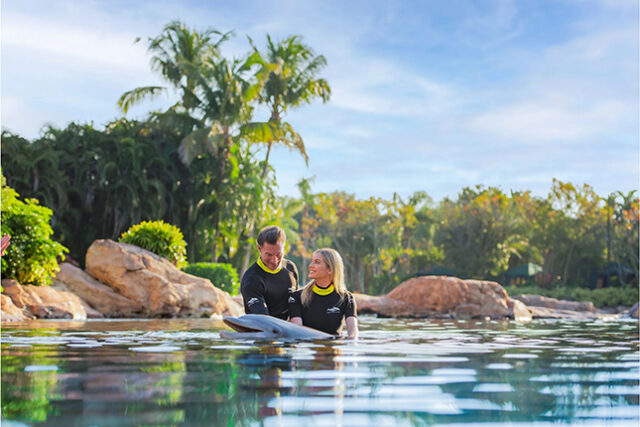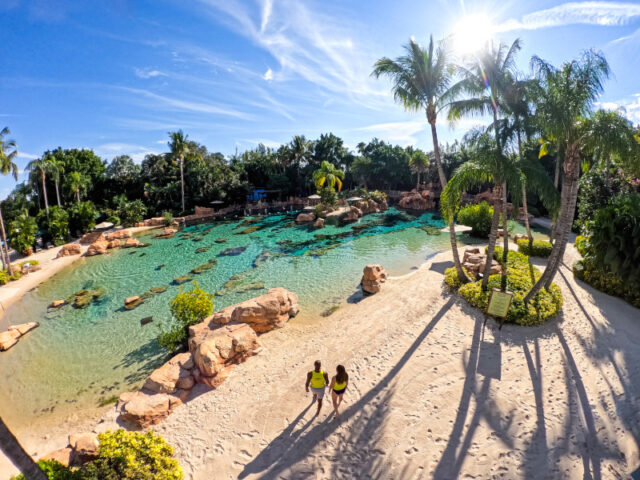Blackfish is billed as a documentary, but instead of a fair and balanced treatment of a complex subject, the film is inaccurate and misleading and, regrettably, exploits a tragedy that remains a source of deep pain for Dawn Brancheau’s family, friends and colleagues. To promote its bias that killer whales should not be maintained in a zoological setting, the film paints a distorted picture that withholds from viewers key facts about SeaWorld – among them, that SeaWorld is one of the world’s most respected zoological institutions, that SeaWorld rescues, rehabilitates and returns to the wild hundreds of wild animals every year, and that SeaWorld commits millions of dollars annually to conservation and scientific research. Perhaps most important, the film fails to mention SeaWorld's commitment to the safety of its team members and guests and to the care and welfare of its animals, as demonstrated by the company’s continual refinement and improvement to its killer whale facilities, equipment and procedures both before and after the death of Dawn Brancheau.
Inaccurate reports recently have generated questions about SeaWorld and the animals in our care. The truth is in our parks and people, and it’s time to set the record straight.
The men and women of SeaWorld are true animal advocates. We are the 1,500 scientists, researchers, veterinarians, trainers, marine biologists, aquarists, aviculturists, educators and conservationists who have dedicated our lives to the animals in our care as well as those in the wild that are injured, ill or orphaned. Whether it’s a sea lion, manatee, sea turtle or whale, we are on call 24/7.
Here are some important facts about SeaWorld and our work:
SeaWorld does not capture killer whales in the wild. Due to the groundbreaking success of our research in marine mammal reproduction, we haven’t collected a killer whale from the wild in 35 years. In fact, only two of the whales in our care were collected by SeaWorld and they continue to be in our care today. In addition, our research has led to a much greater understanding of whales in the wild, giving researchers important scientific insights surrounding marine mammal reproduction.
We do not separate killer whale moms and calves. SeaWorld recognizes the important bond between mother and calf. On the rare occasion that a mother killer whale cannot care for the calf herself, we have successfully hand raised and reintroduced the calf. Whales are only moved to maintain a healthy social structure.
SeaWorld invests millions of dollars in the care of our killer whales. In the last three years alone, we have invested $70 million in our killer whale habitats and millions of dollars annually in support of these facilities. Our habitats are among the largest in the world today. They are state-of-the-art, multimillion-gallon environments of cooled and filtered water that allow for the highest and safest standards of care. We give our animals restaurant-quality fish, exercise, veterinary care, mental stimulation, and the company of other members of their species.
SeaWorld’s killer whales’ life spans are equivalent with those in the wild. While studies continue to define the average life span of killer whales in the wild, the most recent science suggests that our killer whales’ life spans are comparable — indeed, five of our animals are older than 30, and one of our whales is close to 50.
The killer whales in our care benefit those in the wild. We work with universities, governmental agencies and NGOs to increase the body of knowledge about and the understanding of killer whales — from their anatomy and reproductive biology to their auditory abilities. Some populations of wild killer whales have been classified as endangered or threatened, demonstrating the potential critical nature of these research opportunities. This type of controlled research and study is simply not possible in the wild, and has significant real-world benefits to the killer whales that live there.
SeaWorld is a world leader in animal rescue. The millions of people who visit our parks each year make possible SeaWorld’s world-renowned work in rescue, rehabilitation and release. We are constantly innovating when it comes to this care: Our veterinarians have created nursing bottles to hand-feed orphaned whales, prosthetics to save sea turtles, and a wetsuit to help injured manatees stay afloat during rehabilitation. Whether it’s the result of natural or man-made disasters, SeaWorld is always on call and often the first to be contacted. We have rescued more than 23,000 animals with the goal of treating and returning them to the wild.
Naturalist Baba Dioum put it best when he said, “In the end we will conserve only what we love; we will love only what we understand; and we will understand only what we have been taught.”
At SeaWorld, this has been our calling since we first opened our doors 50 years ago. It is a responsibility we do not take lightly. More than 400 million guests have visited SeaWorld. We are proud that their experiences here have a lasting and positive impact on them, and on the world in which we live.
The truth about SeaWorld is right here in our parks and people. Our guests may enter our gates having never given much thought to the remarkable animals in our oceans. When they leave with a greater appreciation for the importance of the sea, educated about the animals that live there and inspired to make a difference, we have done our job.
A response to Blackfish from Michael Scarpuzzi, Vice President of Zooligical Operations for SeaWorld San Diego who has been caring for and training killer whales for nearly 40 years
Shortly after 1:30 p.m. on Feb. 24, 2010, a SeaWorld Orlando trainer lost her life in a tragic accident involving one of the park’s killer whales. The death of Dawn Brancheau was an occasion of almost unbearable sadness for those closest to Dawn — her family, friends and colleagues at SeaWorld. I was honored to know Dawn and count myself among those SeaWorld team members deeply affected by her loss.
Dawn’s death has been the subject of thousands of articles, broadcast news stories, blogs, books, and now a feature film called Blackfish. Many of these accounts trade in the details of Dawn’s death in graphic detail. They do so not to inform but, rather, regrettably, because of the desire to sensationalize. The three years since Dawn’s death have seen the emergence of individuals who have chosen not to honor her memory, but rather to use the events of Feb. 24, 2010 to advance their own interests. Some seek commercial gain. Others seek to forward a political or philosophical agenda. Still others appear to be engaged in self-promotion.
But anyone approaching this subject in good faith must recognize a simple fact: Our staff has interacted with killer whales — for veterinary care, training, shows, educational presentations, husbandry, exercise, play and enrichment — hundreds of times a day for nearly 50 years. The tragedy of Dawn’s death cannot and has not been ignored, but neither should the literally millions of safe interactions we have had with killer whales over that span of time. Blackfish focuses on a handful of incidents over our long history at the exclusion of everything else. Not a single interview with a guest who was inspired and enriched by their experience with killer whales at SeaWorld. Not one visitor who left SeaWorld more aware of the need to preserve the world around them. Not one word about the thousands of ill, orphaned and injured animals rescued by SeaWorld or the millions of dollars we dedicate to supporting conservation and research. There is no acknowledgment anywhere in the film of the great things SeaWorld does every day or the simple fact that our animals are healthy and passionately cared for.
I started at SeaWorld in 1975 and have witnessed the growth and changes that come with a company that is dedicated to understanding these magnificent animals. We have collected invaluable information about these animals that could not be obtained from observation in the wild. In the three years since Dawn’s death, we have again made significant changes at SeaWorld. We have altered how we care for, display and train these extraordinary animals. We have changed the facilities, equipment and procedures at our killer whale habitats. The care and educational presentation of these animals at SeaWorld has been made safer than ever before. Does Blackfish inform its viewers of that fact? No, it does not. And by that omission the film reveals itself not as a work of objective documentary filmmaking, but rather as something closer to propaganda. As we have said many times, there is simply no higher priority for us than the safety of our guests and staff and the welfare of our animals.
We understand that there will always be individuals and groups opposed to the care of animals in zoos and aquariums. We recognize that we must defend what we do and the manner in which we do it. Blackfish, like other works driven by the same agenda, ignores the extraordinary benefits to conservation, scientific research and education of America’s zoo and aquariums. But through it all SeaWorld remains the world’s most respected marine zoological institution. Our parks are staffed with skilled and caring zoological professionals, all of whom deserve to have their work celebrated, not dishonored by things like Blackfish.
Despite what the makers of this film may suggest, SeaWorld is the kind of organization that draws dedicated and passionate people like Dawn Brancheau. These are the men and women who have built SeaWorld into an extraordinary place, one that provides inspiring, enriching and educational experiences to more than 11 million people each year. That, not the inaccurate and shamefully misleading account in Blackfish, is what SeaWorld really is.
Back to news

